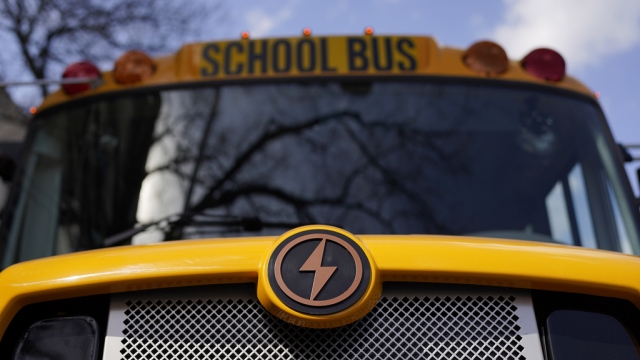As the U.S. undergoes a transition to clean energy, yellow school buses are coming along for the ride.
The problem is that there's half a million of them on the roads, and they pollute the air our children breathe.
A 2001 study by the National Resources Defense Council determined children were exposed to as much as four times the level of exhaust compared to someone in a car. 25 million children ride the school bus every day.
"This might be their biggest exposure to pollution from diesel engines," said Rebecca Leber, a reporter with Vox. "which produce a lot of different emissions that are really concerning to kids' lungs, which include sulfur oxides, nitrogen oxides, and probably most concerning of all particulate matter."
The average U.S. school bus age is nine years, and most are retired by age 12 or 250,000 miles.
The Bipartisan Infrastructure Law, signed by President Joe Biden in 2021, provides $5 billion to convert existing buses to zero-emission or low-emission models. Hundreds of millions more in federal and state grants are also on offer.
So what are the options for replacing an aging, dirty bus?
New diesel engines produce 90% less nitrogen and sulfur pollution and are more efficient than old diesel buses built before 2006. And they're the least expensive option.
The Yuma, Arizona, school district recently replaced six of its old diesel buses with new diesel ones.
"They're cleaner, they're quieter, they're better for student health," said Ron Schepers, the district's director of transportation.
Then there's propane buses. They pass the smell test and the eye test, with the same pollution as your gas grill at home. They're even cleaner in terms of nitrogen and sulfur toxins, and the propane industry is pushing their adoption.
"When you compare propane to diesel, it produces fewer particulate matter emissions. At the same time, it produces other types of emissions because it is a fossil fuel. So when you burn it, you are producing certain types of air pollution, and it also contributes to climate change," said Leber.
Which brings us to electric buses, which are so far the preferred replacement for diesel in the industry.
So far, around 6,000 electric school buses are on the roads, according to the World Resources Institute.
The differences don't stop at the tailpipe. "Talking to school bus drivers who actually engage with this technology, one was describing that it's so quiet that she can actually hear the children too well and has to tell them to keep the noise down," says Leber.
Converting existing diesel buses to electric is another option. SEA Electric, out of Australia, is working with Illinois vehicle company Midwest Transit Equipment to convert ten thousand existing diesel school buses to electric motors.
"The electric buses are coming. The challenge right now with the electric buses is the cost and the infrastructure," said Brian Flaggs, ABC student transportation.
Leber says electric buses are between three and four times more expensive than diesel to purchase.
"This is why electric technology really needs extra support from places like the federal government and states," she says.
Electrifying the nation's school buses could pave the way for other types of electric vehicles, says Leber, since their predictable routes could help the industry gain expertise in efficiently using the batteries.
SEE MORE: Why are school buses yellow?
Trending stories at Scrippsnews.com





